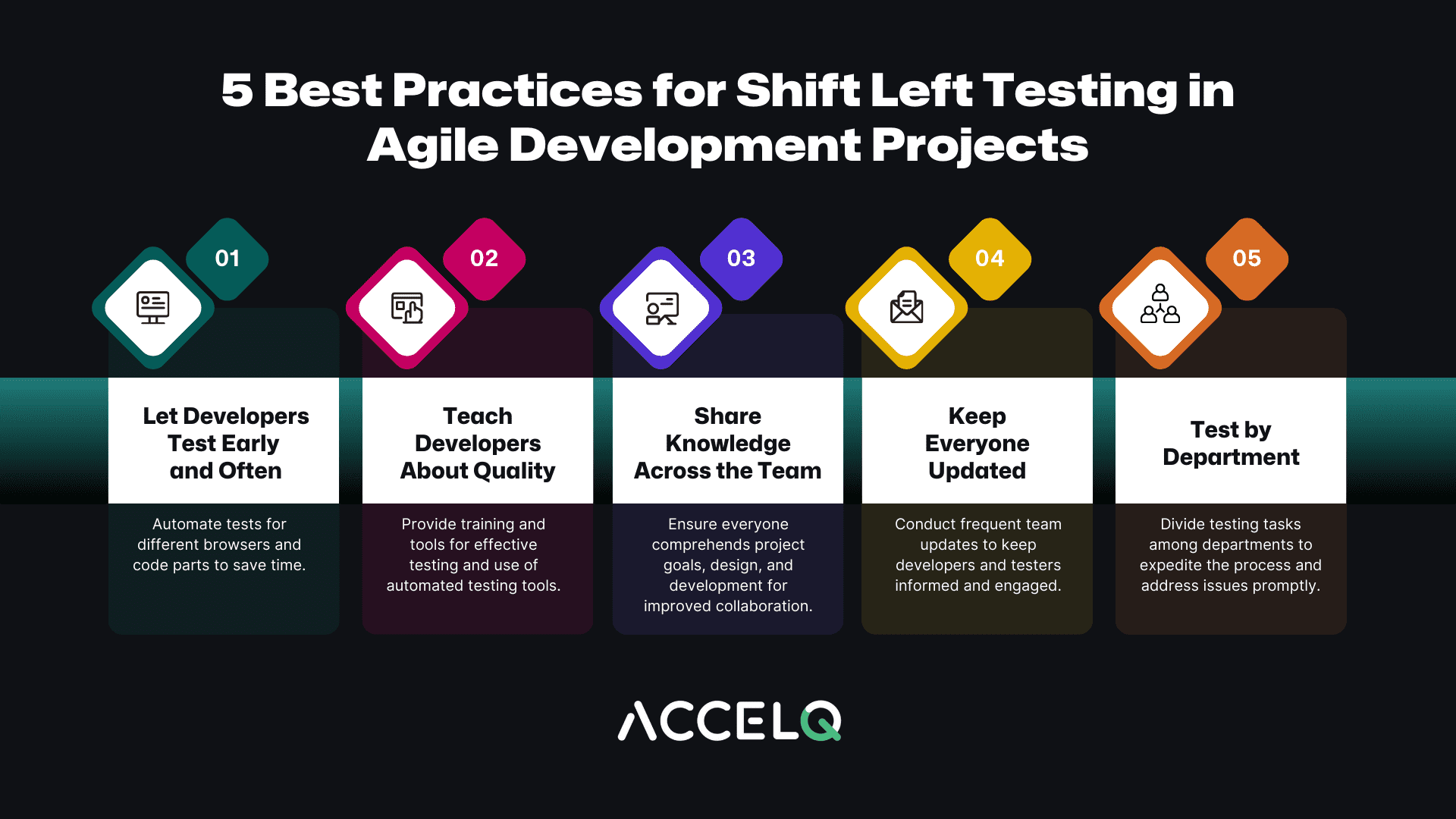Shift Left Testing in Agile: Why & Best Practices

In application development, one of the most debated topics today is manual vs. automated testing. Manual testers face huge pressure to make a switch to automation testing even in technology career paths.
While the need to figure out a solution to the manual testing vs. automation testing debate is ever more essential, it is equally important to know the reasons behind why a typical manual quality assurance tester is increasingly looking at options to switch into automation testing. Therefore, let us examine the backdrop in which quality assurance manual testing is being increasingly replaced by automation testing worldwide.
What is Shift Left Testing in Agile
Shift Left Testing is about testing your software early in development, especially in Agile projects. In traditional testing, you build your software first and then test it. But with Shift Left Testing, you start testing right from the beginning and keep testing as you go.
This fits perfectly in Agile because Agile is about making small changes and checking them often. So, instead of waiting until the end to find out if there are any big problems, you find and fix problems as soon as they pop up. This way, you won't have any surprises, and your software is better because you have been checking it all along.
Shift Left Testing means your developers and testers work together more closely. They ensure that testing isn't just one step at the end but a part of every step. This helps everyone catch mistakes early and improves the whole process and your software.
Why Shift Left Testing?
We are moving into a digital economy powered by cloud-based and micro-services-oriented applications. In this context, achieving seamless end-to-end test automation becomes a key priority.
To achieve better efficiency, it is important to break down testing approaches into smaller components with less complexity. In the shift-left approach, this is exactly the direction in which the testing and validation activities move. By testing early, testing teams can catch the defects early, and development teams can rectify those at the component level. Later, during the integration testing, the chances of finding a lot of defects reduce dramatically.
Additionally, by catching defects earlier, enterprises can release better quality apps with lower costs of operations. Bringing in more effi ciency at the component level enhances automation of the continuous integration and delivery practices. This ultimately lowers risks of operations, especially when new features are released.
5 Best Practices for Shift Left Testing in Agile Development Projects
When working on digital applications, you want to ensure they are top-notch and don't cost too much. Shift Left Testing is a way to do this, but figuring out how to make it work best can be tricky. Here are five simple ways to get more value from Shift Left Testing in your projects:
Let Developers Test Early and Often:
With Shift Left, you want your app to be strong immediately. This means developers should always test their work, not just at the end. Automating tests like checking how the app works on different browsers or testing parts of the code can save much time.
Teach Developers About Quality:
Developers are key to testing in Shift Left. They need to understand what good quality looks like and how to test for it. This means giving them the right training and tools so they know what problems to look for and how to use automated testing tools.
Share Knowledge Across the Team:
Everyone in the team should understand the whole project, not just their part. This includes people who test the app. They should know everything from what the app needs to do, to how it's designed and built. This helps everyone do their job better.
Keep Everyone Updated:
Developers and testers need to know what they did well and what they can do better. Regular updates mean everyone knows what's going on, and there's no confusion or wasted time.
Test by Department:
If your app is big, break it down and test it piece by piece. This way, you don't have to wait for one big test at the end. Each team can test their part, fix any issues, and move on. This makes the whole process faster and smoother.
How to derive maximum ROI from shift left Testing?
The best practices outlined in this blog will help enterprises seamlessly onboard a shift left methodology for their testing initiatives.
The shift left testing approach ensures that end-users face no disruptive experiences while using the application. All critical bugs are discovered and rectified in the initial development stages itself. However, to achieve maximum ROI, it is equally important to automate the entire cycle of test activities, irrespective of the type of test.
Going for a traditional, manual intensive test effort will deprive the enterprise of unbiased quality assurance. Additionally, automation helps to accelerate granular verification and validation of an enterprise application, thereby paving the way for faster integration, regression, and acceptance testing. Ultimately enterprises can quickly rollout for new applications or new features to existing applications.
To make this a reality, it is important to have an extensive platform deployed for end-to-end test automation. Get in touch with us for a free trial to explore more about delivering winning customer experiences with better quality digital applications.
Suma Ganji
Senior Content Writer
Expertly navigating technical and UX writing, she crafts captivating content that hits the mark every time. With a keen SEO understanding, her work consistently resonates with readers while securing prime online visibility. When the day's work ends, you'll find her immersed in literary escapades in her quaint book house.
Discover More
 Tips For Building An Effective Test Automation Framework From Scratch
Tips For Building An Effective Test Automation Framework From Scratch
Tips For Building An Effective Test Automation Framework From Scratch
 Efficient Test Coverage: Maximize Test Coverage in Less Time
Efficient Test Coverage: Maximize Test Coverage in Less Time

































